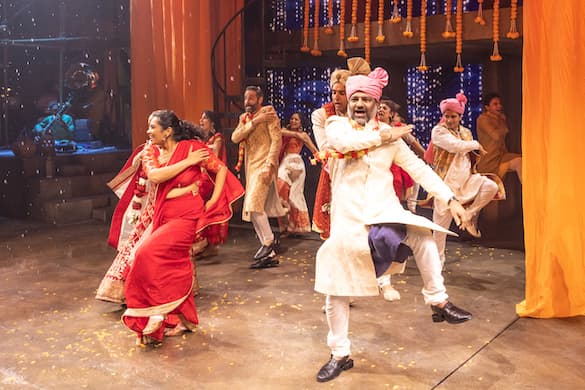Despite Being More ‘Mamma Mia’ Than ‘Fiddler,’ ‘Monsoon Wedding’ Delights
While Mira Nair’s musical based on her critically acclaimed 2001 film falls short of the nuanced work it aspires to, I found myself laughing in delight at the dialogue, the performances, and the ridiculous details.

A group of Americans arrive at a vibrant city to celebrate the wedding of a young bride and a winsome groom. As extravagant nuptial preparations are made, new romances bud, friendships are tested, and dark family secrets surface. Caste systems and traditional family structures are challenged. The young lovers wed in a touching ceremony. Actors don bodysuits and dance in front of a sparkle-scrim. A mega-mix group number ensues.
If you think this is “Mamma Mia,” you’d be incorrect: It’s “Monsoon Wedding,” which opened May 22 at St. Ann’s Warehouse.
Based on Mira Nair’s critically acclaimed 2001 film, the musical focuses on the merging of two vastly different Indian families through an arranged marriage. These divides represent, in part, the lasting implications of the 1947 partition of the Indian subcontinent into independent nation states.
Many developments have occurred since “Monsoon Wedding” made its stage debut, to mixed reviews, at Berkeley Repertory Theater in 2017. In 2020, the show made a cross-country journey to Brooklyn’s bastion of experimental theater, where it was delayed due to Covid. Last year, the musical was curated as a special project in association with the FIFA World Cup, and it is now mounting its long-awaited second run.
Inspired by the 2004 Broadway revival of “Fiddler on the Roof,” Ms. Nair, who also directed the stage version, saw an opportunity to explore her Indian family experience in a way that would shatter cultural barriers. “We’d made a movie that was our version, in a sense,” she said to the New York Times. “It’s about our families, but so deeply universal — this essential story of understanding a whole society and movement through a very personal story.”
In the end, the show is less “Fiddler” and more “Mamma Mia,” falling short of the nuanced work it aspires to. Mr. Nair’s direction, though perfect for close-ups on film, feels wandering on Jason Ardizzone-West’s brutalist set. The score, with music by Vishal Bhardwaj and lyrics by Masi Asare and Susan Birkenhead, is ABBA-adjacent, characterized by driving Eastern beats and pop melodies inspired by the raag, thumri, khayal, and qawwali musical traditions.
Book writers Arpita Mukherjee and Sabrina Dhawan often emulate the framework set by the “Fiddler” book writer, Joseph Stein, if with less finesse. Rambling dialogue is often used to demonstrate marital strife or relational distance where a simple question might’ve sufficed, such as, “Do you love me?” The show’s heavier subplot, seemingly forgotten or ignored, rears its head after the piece has climaxed and the audience is ready to exit.
Despite its problems, I loved “Monsoon Wedding” for the same reason I love “Mamma Mia”: What the show lacks in seriousness it makes up for in joy. The audience was deeply invested in the cast, a large family of actors and musicians from India and the Global Indian Diaspora. (Cheers broke out when the romantic leads reconciled).
I found myself laughing in delight at the dialogue, the committed performances, and the show’s more ridiculous details. My jaw dropped many times at the vibrant costuming and the extravagant stage-rain. “It’s so moving to see a company of Indians and Indian-Americans on a major New York stage, authentically telling a story with which they all identify in some way,” Ms. Nair told the Times. It’s true — I was moved to tears.
Ultimately, “Monsoon Wedding” is an exuberant exploration of Indian culture, and an immersive gift to those who have yet to experience it firsthand.

